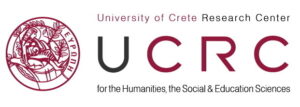Chair. Stavroula Tsinorema
 Professor of Modern & Contemporary Philosophy and Bioethics, Director of Joint Graduate Programme “Bioethics” and Director of the Centre for Bioethics of the University of Crete. She has acted twice as Head of the Department of Philosophy and Social Studies, as Head of the Division of Philosophy of the same Department, and Director of Studies of Joint Graduate Programme “Philosophy: Science, Values & Society”. She was the founding Director of the Centre for Philosophical Research and Translation of the University of Crete. She holds a First Class Honours Degree in Philosophy from the Department of Philosophy, University of Athens, followed by M.A. in Moral and Social Philosophy from the University of Exeter and Ph.D. in Moral Philosophy from the same University. She has held a Committee of Vice-Chancellors and Principals Award (UK), Exeter University Scholarship (UK), and A.K. Mellon Foundation Fellowship (USA). Before coming to Crete, she taught at the University of Ioannina, Greece, and University of Exeter, UK. She has held visiting posts/fellowships at the Universities of Leeds, Pittsburgh (Center for Philosophy of Science), Oxford (St. John’s College), Texas at Austin, London School of Economics and Political Sciences (Centre for Philosophy of the Natural and Social Sciences), University of London (Institute of Philosophy Fellowship ), Stanford University.
Professor of Modern & Contemporary Philosophy and Bioethics, Director of Joint Graduate Programme “Bioethics” and Director of the Centre for Bioethics of the University of Crete. She has acted twice as Head of the Department of Philosophy and Social Studies, as Head of the Division of Philosophy of the same Department, and Director of Studies of Joint Graduate Programme “Philosophy: Science, Values & Society”. She was the founding Director of the Centre for Philosophical Research and Translation of the University of Crete. She holds a First Class Honours Degree in Philosophy from the Department of Philosophy, University of Athens, followed by M.A. in Moral and Social Philosophy from the University of Exeter and Ph.D. in Moral Philosophy from the same University. She has held a Committee of Vice-Chancellors and Principals Award (UK), Exeter University Scholarship (UK), and A.K. Mellon Foundation Fellowship (USA). Before coming to Crete, she taught at the University of Ioannina, Greece, and University of Exeter, UK. She has held visiting posts/fellowships at the Universities of Leeds, Pittsburgh (Center for Philosophy of Science), Oxford (St. John’s College), Texas at Austin, London School of Economics and Political Sciences (Centre for Philosophy of the Natural and Social Sciences), University of London (Institute of Philosophy Fellowship ), Stanford University.
Seraphim Seferiades, “The Political Context: Contentious Politics and Movement Outcomes in the Greek 60s”
My goal in this –still evolving— research is to employ contemporary Contentious-Politics theory to shed light (highlight, problematize and explicate) features of the Greek 60s: a period extremely rich in causal mechanisms characterizing social protest but also processes pertaining both to democra- tization and its opposite (democratic hollowing). The cognitive orientation, however, is bi-directional: it involves exploring both how theory helps us understand the Greek case, and how the Greek case helps us refine theory. I first examine the ways in which the ‘contentious cycle’ problématique helps us analyze (a) organizations; (b) frames; (c) collective-action repertoires; and (d) contentious diffusion. I then move to an explanatory synthesis relating the contentious cycle to the underlying –and changing— Political Opportunity Structure, and conclude by tentatively generalizing about the relationship existing between contentious mobilization and democratization. Throughout the processes addressed, the role of youth mobilization has been of paramount im- portance. Considering that a good deal of it was what we often call ‘spontaneous’, emphasis is also placed on the importance of strategic action
 Seraphim Seferiades (PhD Columbia ‒http://seferiadescv.blogspot.gr) is (elected) Professor of Political Science at the Panteion University of Social and Political Science, Director of the Laboratory on Contentious Politics (https://lcp.panteion.gr/) and Life Member in Politics and History at the University of Cambridge (CLH). For several years the Secretary of the Greek Political Science Association, he has been Senior Member at the University of Oxford (St Peter’s College), Fellow and Tutor in the Arts at the University of Cambridge (CHU), Jean Monnet Fellow at the European University Institute, and Hannah Seeger Davis Fellow at Princeton University. His most recent book is Populism, Democracy, the Left: the Challenge of the Method (Athen: Topos 2021) ‒ https://bit.ly/3DZd3t1.
Seraphim Seferiades (PhD Columbia ‒http://seferiadescv.blogspot.gr) is (elected) Professor of Political Science at the Panteion University of Social and Political Science, Director of the Laboratory on Contentious Politics (https://lcp.panteion.gr/) and Life Member in Politics and History at the University of Cambridge (CLH). For several years the Secretary of the Greek Political Science Association, he has been Senior Member at the University of Oxford (St Peter’s College), Fellow and Tutor in the Arts at the University of Cambridge (CHU), Jean Monnet Fellow at the European University Institute, and Hannah Seeger Davis Fellow at Princeton University. His most recent book is Populism, Democracy, the Left: the Challenge of the Method (Athen: Topos 2021) ‒ https://bit.ly/3DZd3t1.
Giorgos Tsiridis, “The repressive equilibrium in dictatorial Greece: informal broadenings and formal milestones of youth mobilization”
The various manifestations of civil society – illegal movement organizations, legal challengers, informal collectives, and the anti-dictatorial student movement – have emerged and acted at different historical junctures, presenting a diversity in their repertoire of action in correspondence to the regime’s shifting oppression practices. The colonels themselves notedly used the term «liberalization» [fileleftheropeisi] since the beginning of their rule, even before it was established in international literature as a factor of democratization. Their attempt of a controlled political liberalization stimulated the adaptive reflexes of collective challengers, especially within the youth, who swiftly interpreted the partial state disengagement from the public sphere as a political opportunity and adjusted their resistance practices accordingly. This equilibrium between state oppression and youth mobilization eventually led to the Polytechnic student uprising, a major political event of the Greek transitional experience.
 Giorgos Tsiridis graduated from the Department of History and Archaeology of the Aristotle University of Thessaloniki. He continued his studies in Utrecht, The Netherlands in the field of Comparative History, and in 2017 he supported his Doctoral Thesis at the Department of Political Science and Public Administration of the University of Athens. Since May 2020, he is a postdoctoral researcher at the Department of Sociology of the University of Crete. His research focuses on “Political liberalization in the colonels’ dictatorship: political opportunities and institutional traces of collective action”
Giorgos Tsiridis graduated from the Department of History and Archaeology of the Aristotle University of Thessaloniki. He continued his studies in Utrecht, The Netherlands in the field of Comparative History, and in 2017 he supported his Doctoral Thesis at the Department of Political Science and Public Administration of the University of Athens. Since May 2020, he is a postdoctoral researcher at the Department of Sociology of the University of Crete. His research focuses on “Political liberalization in the colonels’ dictatorship: political opportunities and institutional traces of collective action”
Efthimios Papavlasopoulos, Thomas Lazaridis & Mania (Maria) Sotiropoulou, “’I swear never to obey to tyrants’. The actions of youth anti-dictatorship organizations abroad and within the country: the cases of EPES (Association des Etudiants Hellenes de Paris) and the PAOS (Panhellenic Anti-Dictatorship Students Organization) ‘Rigas Feraios’”
The attitude of Greek society towards the dictatorial regime is one of the least studied fields of the Third Hellenic Republic. In the “Metapolitefsis” (post-Junta era), in the resistance narrative, Youth was on center stage, especially during the Athens Polytechnic uprising. That describes the «myth» of resistance, on a symbolic level; as it was the beginning of the fall of the military dictatorship. The limited literature and the scattered empirical evidence document two resistance poles: one abroad (mass and dynamic) and one within the country (limited and sporadic). Also, the role of the international personalities and collectives in strengthening the resistance movement
and in the delegitimization of the regime is highlighted. This paper will attempt to illuminate aspects of Youth resistance, by focusing on the first period of the “Junta” (1967-1971); in this period the regime tried to stabilize and legitimize itself. Our aim is to map the communication channels, the coordination forms of the resistance actions of Youth organizations that acted inside the country and abroad and the initiatives they undertook for the internationalization of the “Greek issue”. Based on the research findings, we will evaluate the efficacy, the limits and the contradictions of their actions.
We will examine through the political, ideological, cultural and theoretical context the demands and repertoire of actions of the youth movement in comparison with the pro-dictatorship era. The EPES (Association des Étudiants Hellenes de Paris) and the PAOS (Panhellenic Anti-Dictatorship Students Organization) “Rigas Feraios” are our case studies. Both organizations developed in the early dictatorship era and had remarkable anti-Junta activity and established communication networks. In both cases, the current research is lacking significant empirical evidence of their actions.
Our study was based on the thematic analysis of their publications (magazines,
newspapers etc.) and interviews with their leaders. The findings of the research aim to contribute to understanding the processes of transition from authoritarian regime and the political-institutional arrangements that laid the foundations of the Third Hellenic Republic.
 Dr. Efthimis Papavlasopoulos is a assistant professor in the Department of Political Science at the University of Crete. He studied Law and Political Sciences at the University of Thessaloniki. He has published on Greek politics and comparative party systems and has taught political science and political sociology in the Law Faculty at the University of Thessaloniki, the Department of Social and Education Policy of the University of the Peloponnese and the Department of Political Science and Public Administration of the University of Athens
Dr. Efthimis Papavlasopoulos is a assistant professor in the Department of Political Science at the University of Crete. He studied Law and Political Sciences at the University of Thessaloniki. He has published on Greek politics and comparative party systems and has taught political science and political sociology in the Law Faculty at the University of Thessaloniki, the Department of Social and Education Policy of the University of the Peloponnese and the Department of Political Science and Public Administration of the University of Athens
 Thomas Lazaridis is a PhD Candidate at University of Crete (UoC). His dissertation examines the relation between Right and Far-Right in Greek political system after 1974 (Metapolitefsis). He holds a MA in Political Sociology and Comparative Politics from Panteion University of Athens (2020) and a BA in Political Science from UoC. His current research interests focus on the Far-Right parties and politics and the Greek political and party system.
Thomas Lazaridis is a PhD Candidate at University of Crete (UoC). His dissertation examines the relation between Right and Far-Right in Greek political system after 1974 (Metapolitefsis). He holds a MA in Political Sociology and Comparative Politics from Panteion University of Athens (2020) and a BA in Political Science from UoC. His current research interests focus on the Far-Right parties and politics and the Greek political and party system.
 Mania Sotiropoulou is a PhD candidate in Political Science, University of Crete. She holds a Master’s Degree in Political Science and Sociology, University of Athens and a Master in Research of Political Science, Universitat Pompeu Fabra-Barcelona. She graduated from the Department of Political Science and Public Administration, University of Athens. She has participated in research projects of oral history, recording and study of the political staff in the local government in the 2019 elections, as well as study of the political discourse of the parties for the consumption during the period 2010-2017.
Mania Sotiropoulou is a PhD candidate in Political Science, University of Crete. She holds a Master’s Degree in Political Science and Sociology, University of Athens and a Master in Research of Political Science, Universitat Pompeu Fabra-Barcelona. She graduated from the Department of Political Science and Public Administration, University of Athens. She has participated in research projects of oral history, recording and study of the political staff in the local government in the 2019 elections, as well as study of the political discourse of the parties for the consumption during the period 2010-2017.


